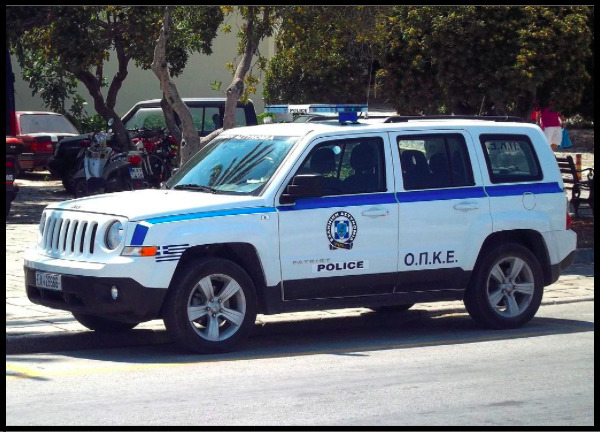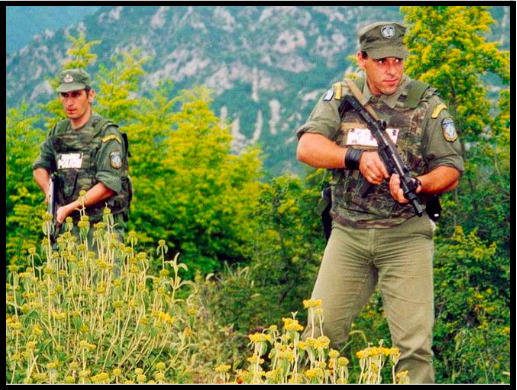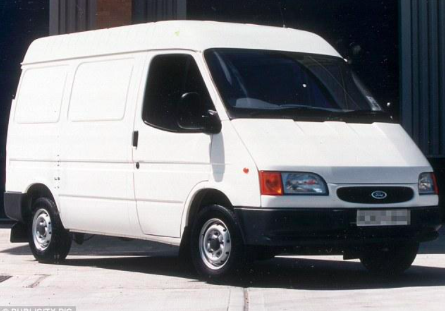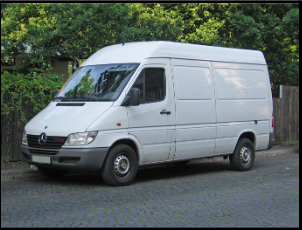On April 9th, 2022, the respondent, a 29-year-old Moroccan man, was pushed back from Praggi, Greece to Eskiköy, Turkey. He was previously illegally pushed back from Greece five times in 2021 and three times in 2022.
He and three other Moroccan men, ranging in age from 27 to 33, set out from Edirne at around 7 p.m. on April 6th. They walked for about six kilometers to a spot along the border near the village of Bosna, arriving at around 8:30 pm. The respondent said there were fields with corn and other crops all around them and estimated that the border fence was about eight meters high.
At 9 about p.m. the four men crossed the border into Greece. They ran through fields, trying to get as far as possible from the border, until they reached a forest after six kilometers away, where they stopped to rest for about five minutes. They continued walking for the next three days, stopping every five or six kilometers to take a short break. Sometimes they rested for an hour or two, but otherwise they walked day and night through fields and forests, recalled the respondents.
At around 10 a.m. on April 9, the group was apprehended outside the Greek village of Petrota. They had run out of food and other supplies and they needed to continue their journey. Looking at a map, they realised they were near a hotel on the outskirts of the village and decided to go seek assistance. The respondent recounted:
“We thought it was a good idea to go and ask for help. We were just standing in front of the hotel’s front door when we encountered a man working there. He started yelling and told us to go far away. He screamed, saying ‘Police police police!’ At that moment, we decided to run away so he wouldn’t have the chance to call the police while we were still close to the hotel…We went back and ran through the farmlands, hoping that we would get to the mountain before he actually called the police. But after ten minutes we crossed a small forest and then arrived at a paved road. While we were trying to cross the road, some cars came quickly from both directions and stopped us, just one inch after the paved road.”
Three cars stopped in front of the transit group: an old olive green land cruiser; a black Hilux pickup; and a white Jeep with a blue stripe on the side. The first two cars were unmarked but the white jeep had “police” written on the left side. The respondent confirmed the white jeep as matching the vehicle displayed in Image 1.

Eight uniformed men arrived with the cars. Three of them were wearing sage green shirts and pants with flags resembling the Greek flag on them and “police” written in English across their chests, identified by the respondent as similar to the uniforms in Image 2. Another two were wearing dark blue uniforms with bullet proof vests that had “police” written on them and insignia on their shoulders. The last three were wearing plain black uniforms with nothing written on them. None of the men were wearing balaclavas, but one of the men in the black uniforms had sunglasses on and appeared to be in command, recalled the respondent.

The officers were also carrying both small and large firearms, noted the respondent.
Reportedly, two of the uniformed men pointed their firearms at the group and told them to get down. Then, they put away their firearms and three of them, two wearing black uniforms and one in a sage green uniform, pulled out plastic batons and began to hit the four men all over their bodies for about five minutes, recalled the respondent. Though they were next to the road, he said no one passed by or saw them.
The uniformed men asked the respondent where he was from and where he crossed. The respondent described how it was impossible to reply, “You don’t have the right to talk to them. I wanted to speak and one of them kicked me on my back.”
After beating the men and asking them a few questions, the uniformed men reportedly told the group to hand over their phones. When they saw that the group only had one phone among the four of them, they laughed, as if they knew the group had been pushed back before, described the respondent. One of the officers reportedly kicked the respondent on his shoulder while he was sitting.
The respondent reported that the uniformed men were speaking Greek to each other and English to him and his companions. After about 30 minutes, during which time the group remained seated, an old white transit van with no rear license plate arrived. The respondent said it was similar to the one in Image 3.

The respondent was unable to see who was driving the van before he and his companions were loaded into the back and the door was locked from the outside. For approximately 30 minutes, the van drove in a fast and reckless manner until they arrived at a detention site. There were no windows in the back of the van so the respondent couldn’t see anything along the way, he recalled.
Finally, the van parked and the door opened to reveal a hallway that led to several holding cells and a big room. The respondent said it was an “old building” with “old black dirty walls” that resembled an abandoned factory. He couldn’t see if there were any other vehicles parked there or if there were any nearby buildings. Later, from a small window in the holding cell, he reportedly saw old tires and trails in the yard behind the building.
The respondent didn’t see anything at the site to indicate that it was a police or the military building, but said there were six men and one woman wearing uniforms. Five of them were wearing marine blue uniforms with “police” written on them while two of the others were wearing sage green uniforms similar to the ones the officers who caught them had been wearing. All of them had insignias on their shoulders. The respondent identified the green uniforms from Image 2.
Reportedly, the group was brought into a room and told to undress completely. The respondent said, “They started searching us. They asked us things in Greek and they hit us if we didn’t understand what they were saying.” For about 20 minutes, the four men stood naked while two uniformed men searched their clothes and three others punched them, kicked them, and beat them with a plastic baton, recalled the respondent. Their shoes and jackets were taken from them as well as 50 euros that they had hidden, which a uniformed man had found by cutting the respondent’s friend’s pants, recounted the respondent,“When the man cut my friend’s pants with a knife, he passed the knife in front of our faces and neck.”
Finally, they were allowed to put on their pants and sweaters and were brought to a holding cell, where there were already around 30 other men from Morocco, Algeria, Syria, and Afghanistan ranging in age from 20 to 40 years old. The respondent estimated that the cell was five by six meters and said it had a dirty floor, no toilet, and two bunk beds without mattresses. He said they were held there for over 10 hours, during which time many more people were put in the cell with them. At the end of the day, he estimated that there were around 120 or more people in the cell, including about seven women and more than 15 minors. The ages ranged from seven to 60 years old and the nationalities varied from Syria to Morocco to Afghanistan to Algeria to Pakistan. They weren’t given any food or water while they were detained and had no access to a toilet.
At around 9 p.m., the detainees were taken out of the cell by two men wearing short sleeve green camouflage shirts with no writing on them, sage green pants, and balaclavas. Outside, they found at least 15 other uniformed men, wearing the same sage green uniforms and marine blue uniforms as the previous officers.
The respondent reported that all but two or three of the men were also wearing balaclavas and some were holding tree branches or metal batons. He said it was dark, so he couldn’t see much, but recalled seeing trees around the detention site and four vans parked nearby; two of the vans were white, one was blue, and the other was yellow. He said the one he was put in, which was bigger than the others, looked like the van in Image 4.

The respondent estimated that around 40 people were put into the van with him, in a space that measured about two by three meters. He described how it was hard to breathe as so many people were crowded into such a small space, and that the air was filled with both dust from the dirt road they drove on and smoke from the engine. The drive lasted about 30 minutes, during which time the respondent recalled fearing the van might flip over a few times, due to the reckless and fast driving.
When they stopped and were let out of the van, at what the respondent thought was around 10 p.m., he saw that they had parked in a forest by the Evros/Meriç river, about 400 meters from the road. He recalled:
“There was an unpaved road that ended in a small clearing, where they told us to sit down in a line. There was a forest surrounding it as well as a trailer for transporting the boat. And a black Helix [car] was there…the same type as the one that was there when we were apprehended.”
There were also two inflatable rubber boats that were ready when they arrived; one was grey on the outside and white on the inside and measured about three by one meters, the other was blue or black but the respondent never got close enough to see. He said the trailer looked like the one in Image 5.

The other white van and the blue van from the detention site had also arrived to the pushback location; the respondent estimated that in total there were around 80 or more people pushed back with him, including three women and children as young as seven years old. He also reported seeing nine men who acted like officers, including the men who had driven the vans, all of whom had on balaclavas. Three of these men were wearing sage green uniforms similar to the ones aforementioned.
According to the respondent, four of the men were not wearing uniforms and were instead wearing civilian clothing, including some in white and black leather jackets and others in green jackets and pants. The respondent said they were the ones who drove the boats. The last two men were wearing all black uniforms that lacked any writing or insignia. The men in the black uniforms were carrying large firearms, while the rest of the men were carrying branches.
The respondent reported that the men in the civilian clothing spoke Arabic in Syrian and Iraqi dialects, while the uniformed men spoke Greek. He recounted:
“The Arabic-speaking ones were the ones who were translating what the other men were saying. They told us to stay in line, move forward by group, and give them everything we had when they searched us. From time to time they moved down the line and asked where we were from…when I said Morocco he hit me on my back with the branch.”
The respondent recalled that the group were only wearing pants and sweaters, as their jackets and shoes were never returned to them, and that some people in the group were hit with branches while they waited. Nine people at a time were loaded into each boat, along with two drivers: two in the front, four in the middle, and three in the back. He was in the last group to cross and waited for about an hour between the time they arrived and the time he got on the boat.
The boat drivers paddled them to the middle of the river and then made them get out. The respondent said the water was deep in some places and just above his waist in other places, and that they had to be careful while they crossed. He recalled:
“We heard women screaming [in Arabic], ‘We’re gonna sink! We’re gonna sink!’ in the group in front of us, but thank god they made it across in the end with the help of the others.”
After they were pushed back, the respondent and his companions tried to dry off but eventually decided to move away from the Turkish border. They walked through farmland in the Turkish territory for almost 40 minutes until they arrived at a sign that read Eskiköy, as well as Uzunköprü five kilometers and Edirne 25 kilometers.
When asked if he had expressed his intention to claim asylum at any point while in Greece, the respondent answered: “I didn’t. Who is brave enough to talk and ask for asylum? Few are allowed to talk.”
